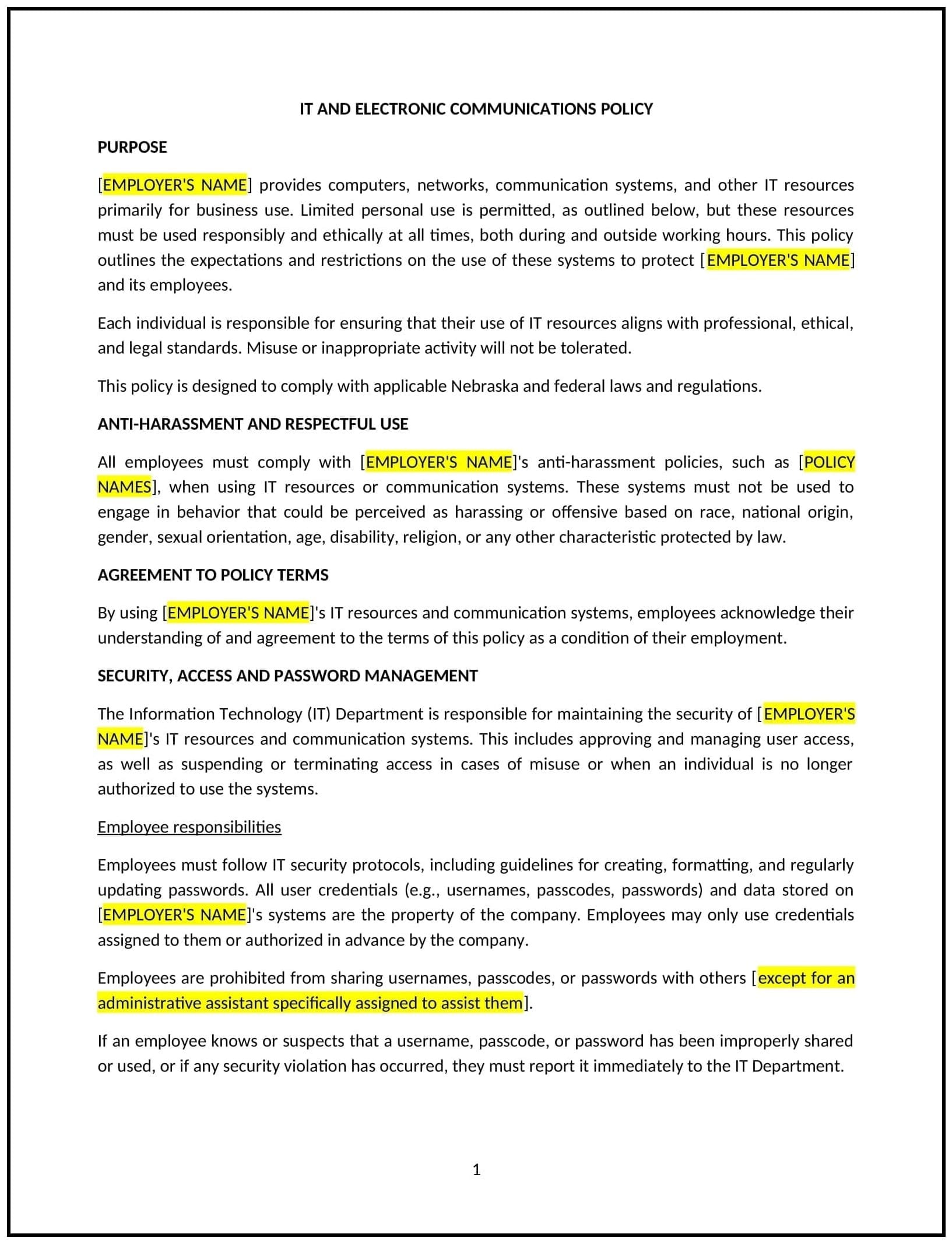IT and electronics communications policy (Nebraska): Free template
Got contracts to review? While you're here for policies, let Cobrief make contract review effortless—start your free review now.

Customize this template for free
IT and electronics communications policy (Nebraska)
An IT and electronics communications policy helps Nebraska businesses manage the use of electronic devices and communications platforms within the workplace. This policy outlines the acceptable use of company-provided equipment, guidelines for electronic communication (such as email, instant messaging, and social media), and security measures for protecting company data and systems. It is designed to promote responsible use of technology, ensure privacy and confidentiality, and minimize the risks associated with cyber threats.
By adopting this policy, businesses in Nebraska can protect their IT infrastructure, foster a productive and secure work environment, and mitigate potential legal or security risks related to electronic communications.
How to use this IT and electronics communications policy (Nebraska)
- Define acceptable use of technology: Specify the types of electronic devices and communication tools that employees are permitted to use for work-related purposes, such as computers, smartphones, email systems, and instant messaging platforms. Clarify what constitutes acceptable and unacceptable use, including prohibiting illegal activities or excessive personal use.
- Address email and messaging guidelines: Outline rules for using company email and messaging platforms, including expectations for professionalism, confidentiality, and respect in communications. Specify that emails and messages should be used for business purposes and should not include offensive or inappropriate content.
- Set security measures: Establish security protocols for using company-provided devices and systems, such as requiring strong passwords, multi-factor authentication (MFA), and encryption for sensitive communications. Address the use of personal devices and whether they are allowed to access company systems or data.
- Prohibit unauthorized software or apps: Clearly state that employees are not allowed to install unauthorized software or applications on company devices or use external devices to store or transmit company data unless explicitly authorized. This helps reduce the risk of malware or data breaches.
- Provide guidelines for social media use: Define expectations for employees' use of social media, both for professional and personal purposes. Employees should understand that they are expected to behave responsibly when discussing the company, its products, or services, and avoid sharing confidential or proprietary information.
- Ensure data protection: Include provisions that require employees to protect sensitive and confidential company data while using IT and electronic communication tools. This includes guidelines on safeguarding data against unauthorized access, accidental loss, or misuse.
- Address remote work and BYOD policies: If applicable, include guidelines for employees who work remotely or use personal devices for work purposes (Bring Your Own Device or BYOD). Specify how employees can securely access company systems and data from outside the office.
- Develop incident response procedures: Create clear procedures for reporting security breaches, incidents of unauthorized access, or any misuse of company electronic systems. Specify how employees should report incidents and the steps the company will take to resolve them.
- Review and update: Periodically review and update the policy to reflect technological advancements, new security threats, or changes in Nebraska state law and federal regulations regarding data protection and electronic communications.
Benefits of using this IT and electronics communications policy (Nebraska)
This policy provides several benefits for Nebraska businesses:
- Protects company data: By outlining security measures and acceptable use, the policy helps safeguard sensitive and confidential data from unauthorized access or cyber threats.
- Reduces legal and reputational risks: Clear guidelines on email, messaging, and social media use reduce the risk of inappropriate content or legal issues arising from electronic communications.
- Improves productivity: By setting expectations for technology use, employees can focus on work-related tasks, reducing distractions and promoting a more productive work environment.
- Promotes professionalism: Clear communication guidelines help employees maintain a professional tone in all electronic communications, improving company culture and the overall work environment.
- Enhances security awareness: Regular training and guidelines around IT and security practices help employees stay informed about the latest security risks and how to mitigate them, reducing the risk of data breaches or other security incidents.
Tips for using this IT and electronics communications policy (Nebraska)
- Communicate the policy clearly: Ensure all employees are aware of the policy and understand the rules for using company-provided technology and communication platforms. Include the policy in employee handbooks and provide regular reminders in training sessions.
- Provide ongoing security training: Regularly train employees on best practices for data security, password management, and how to recognize phishing attempts and other cyber threats. Encourage employees to report suspicious activity immediately.
- Monitor and enforce the policy: Implement monitoring systems to ensure employees are following the policy and to detect any unauthorized access or misuse of company systems. Be consistent in enforcing the policy and addressing violations promptly.
- Update technology regularly: Ensure that company systems, software, and communication tools are regularly updated and patched to protect against vulnerabilities. Maintain a secure IT infrastructure to mitigate security risks.
- Balance privacy and security: Ensure the policy respects employee privacy while also ensuring company data security. Clearly communicate the company’s stance on monitoring electronic communications and the use of personal devices for work purposes.